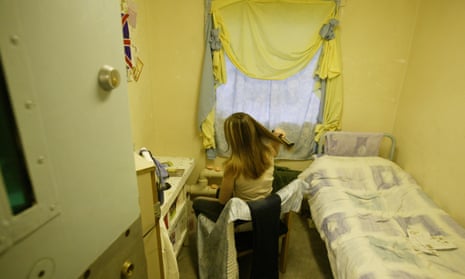The vast majority of vulnerable young women and girls in the criminal justice system in England and Wales have previously suffered abuse and violence and are in danger of being retraumatised by the experience, charities say.
The Young Women’s Justice Project report, published on Friday, urges the Ministry of Justice to act to break the “cycle of abuse, inequality and offending”.
The report, the culmination of two years’ work, brings together existing data and research and shows that up to 90% of girls in contact with the youth justice system have experienced abuse from a family member or someone they trusted, and 63% of girls and young women aged 16-24 serving community sentences have experienced rape or domestic abuse.
Indy Cross, the chief executive of Agenda, which produced the report with the Alliance for Youth Justice, said: “It’s shocking that most girls and young women in the criminal justice system have experienced trauma, and yet their specific needs are ignored in favour of punishment and exclusion. It’s time that the criminal justice system stopped retraumatising vulnerable people and listened to what they are telling us.
“We need girls and young women to be heard instead of harmed. Young women are being punished for their responses to trauma and the survival strategies they rely upon.”
The report also says that:
There is greater prevalence of poor mental health among young women in the criminal justice system compared with young men and older women.
Girls in custody self-harm at much higher rates than boys.
74% of girls in youth custody have previously been permanently excluded from school compared with 63% of boys.
Black, Asian and other minority women and those with experience of the care system are significantly overrepresented among young women who have come into contact with the criminal justice system.
Sarah (not her real name), 22, who contributed to the report, said: “I’ve seen the worst in prison. I get flashbacks all the time. I see people trying to kill themselves, I see babies that have died in prison, pregnant women and stuff. And they don’t care, the system does not care.”
Recommendations in the report include prioritising investment in young women at all stages of the criminal justice system, listening to what their needs are, and ensuring that people working with them recognise and respond to those needs – including needs specific to women from minorities and from care.
Pippa Goodfellow, the chief executive of the Alliance for Youth Justice, said: “Girls and young women’s experiences of coming into contact with the criminal justice system are frequently characterised by multiple forms of disadvantage, including experiences of violence, abuse and exploitation. But throughout the system, from policing to prisons, rather than understanding these vulnerabilities and responding appropriately, they are often met with use of force, physical restraint and isolation.”
A Ministry of Justice spokesperson said: “Since we launched our female offender strategy in 2018 we have seen a 30% drop in the number of women entering the criminal justice system.
“We are also investing tens of millions of pounds into community services like women’s centres, drug rehabilitation and accommodation support. These will help all women, including those who may have experienced trauma such as domestic abuse, get their lives back on track.”
